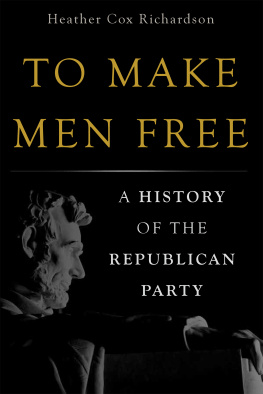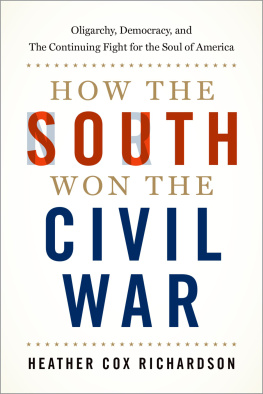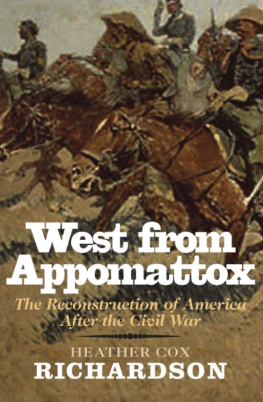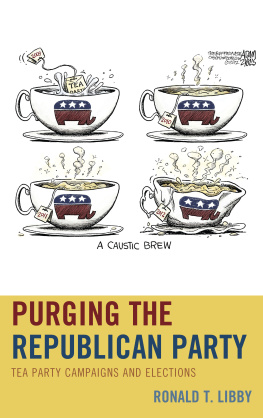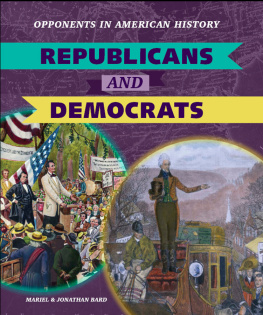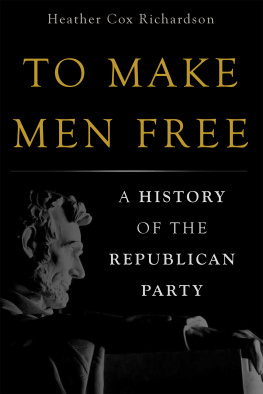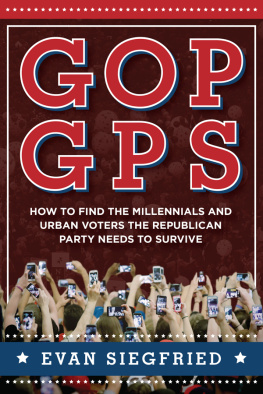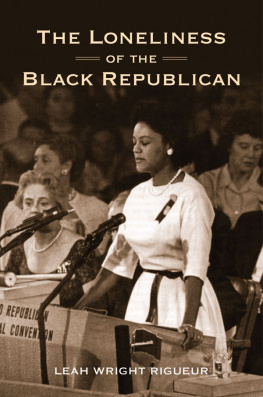All rights reserved. Printed in the United States of America. No part of this book may be reproduced in any manner whatsoever without written permission except in the case of brief quotations embodied in critical articles and reviews. For information, address Basic Books, 250 West 57th Street, New York, NY 10107.
Books published by Basic Books are available at special discounts for bulk purchases in the United States by corporations, institutions, and other organizations. For more information, please contact the Special Markets Department at the Perseus Books Group, 2300 Chestnut Street, Suite 200, Philadelphia, PA 19103, or call (800) 810-4145, ext. 5000, or e-mail special.markets@perseusbooks.com.
Richardson, Heather Cox.
To make men free : a history of the Republican Party / Heather Cox Richardson.
Includes bibliographical references and index.
1. Republican Party (U.S. : 1854- )History. 2. United StatesPolitics and government. I. Title.
I n 1862, in the midst of the Civil War, Republican Justin Smith Morrill stood up in Congress to defend his partys novel invention: an income tax. The government had the right to demand 99 percent of a mans property, Morrill thundered. If the nation needed it, the property of the people... belongs to the government. The Republican Congress passed the income taxas well as a spate of other taxesand went on to create a strong national government. By the time the war ended three years later, the Republicans had fielded an army and navy of more than 2.5 million men; had invented national banking, currency, and taxation; had provided schools and homes for poor Americans; and had freed the countrys four million slaves.
A half century later, when corporations dominated the economy and their millionaire owners threw their weight into political contests, Republican Theodore Roosevelt fulminated against that small class of enormously wealthy and economically powerful men, whose chief object is to hold and increase their power. Insisting that America must break up this class in order to return to an economic system under which each man shall be guaranteed the opportunity to show the best that there is in him, Roosevelt called for government to regulate business, prohibit corporate funding of political campaigns, and impose income and inheritance taxes. He demanded a square deal for the American people.
In the mid-twentieth century, Republican president Dwight Eisenhower reiterated the earlier Republican calls for economic opportunity and applied them on an international scale. Believing that economic inequality bred war and that in the nuclear age war threatened humanity itself, Eisenhower sought to prevent international conflict
At these crucial junctures in American history, Republicans have taken the stand that economic opportunity is central to the American ideal and that it is governments responsibility to make it possible for everyone to rise. At other times, the Republicans have thrown their support behind Americas wealthiest men: Congress has passed laws that benefit businessmenhas even permitted businessmen to write legislationand has blamed those who fell behind for their own poverty. While claiming to be championing laissez-faire government, Republicans and the policies they pursue have been anything but evenhanded; they have protected an increasingly small wealthy population at the expense of Americas majority.
Over the one hundred and sixty years of their history, Republicans have swung from one pole to another: sometimes they have been leftists, sometimes reactionaries. Today, once again, the Republican Party has positioned itself on the far right. How did the Republican Partythe party of Abraham Lincoln, Theodore Roosevelt, and Dwight D. Eisenhowerbecome the party of today?
The journey has not been straightforward.
S ince its formation in the 1850s, the party has, in three different eras, swung from one end of the political spectrum to the other. In each of these cycles, Republicans have replayed the same pattern. In their progressive periods they have expanded the vote, regulated business, and raised taxes. As a result, wealth became widely distributed and the economy strong.
Yet each time the party has sponsored progressive legislation, it has sparked a backlash from within its own ranks. After Lincoln, and after Roosevelt and Eisenhower as well, Republican leaders gradually turned against their own reforms in favor of protecting the interests of the rich. Their argument was always that taxes redistribute wealth, interfering with the fundamental right to property. Adamant that hardworking white men not see their fortunes transferred to lazy African Americans and immigrants, they cut funding for education and social welfare programs. As Republican policy shifted, and the machinery of government was enlisted to promote big business, wealth moved upward. And each timein 1893, in 1929, and most recently in 2008these periods of reaction were followed by a devastating economic crash.
There is nothing at all random about the Republicans ideological shifts. They reflect the GOPs ongoing renegotiation of the partysand the nationscentral unresolved problem: the profound tension between Americas two fundamental beliefs, equality of opportunity and protection of property.
This tension has driven American political life since the nations earliest days. The Declaration of Independence promised citizens equal access to economic opportunity. This was the powerful principle for which poor men were willing to fight the American Revolution, but it was only a principle; it was never actually codified in law. When the Founding Fathers wrote the Constitution, the supreme law that established the American nation, they assumed that the countrys vast resources would ensure equality of opportunity. Worried instead about social stability, they enshrined in the Constitution another principle: that property rights must be protected.

